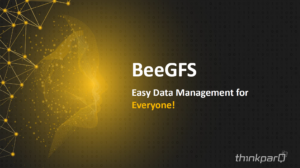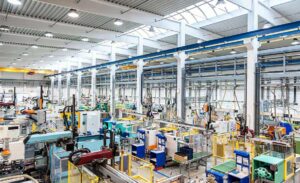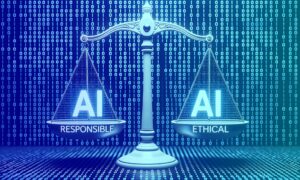Supercomputer for Everyone: Dare to Discover the World of Modern Computing
Once, supercomputers were a mysterious technology accessible only to top scientists working in futuristic laboratories. Today, however, a completely new story is being written. Supercomputers are now available to ordinary users — from universities, small companies, and even public administration — anyone who needs to handle computations far beyond the capabilities of a regular computer.
Researchers have prepared a simple user guide that explains, step by step, how to access available computing power. They did it themselves with the aim of helping anyone who wants to process large datasets, train artificial intelligence, model natural phenomena, or create new technological solutions. Just register, obtain a project, and you can explore, invent, and tackle your boldest ideas.
There’s no reason to be afraid.
You can think of a supercomputer as an extremely powerful machine with thousands of “brains” working together. It’s not sitting in your office or glowing under your desk — it’s housed in a specialized data center, and you control it conveniently through a web browser.
You simply prepare your task and submit it to the system. While the supercomputer gets to work, you can relax and enjoy a cup of coffee. Within minutes or hours, you’ll receive results that would take your laptop weeks to compute — or that it might not be able to handle at all.
Who can it help?
- students processing large amounts of data
- scientists testing new artificial intelligence algorithms
- meteorologists working on weather forecasting
- designers and engineers running simulations and developing new solutions
- doctors and biologists analyzing genomes or medical data
- small innovative companies without their own computing infrastructure
And many other fields are waiting for someone brave enough to explore them.
Why is it important?
We need a new impulse for innovation. We have smart people, bold ideas, and now also a tool that saves time, money, and opens the path to world-class results. The supercomputer is here to accelerate scientific progress and drive economic growth.
The first webinar coming soon
The authors of the guide are preparing a practical webinar designed for complete beginners. We’ll show that access to supercomputing is truly within everyone’s reach — for anyone unafraid to explore new possibilities. The goal is to spark curiosity and break down the barriers between technology and its users.
 BeeGFS in Practice — Parallel File Systems for HPC, AI and Data-Intensive Workloads 6 Feb - This webinar introduces BeeGFS, a leading parallel file system designed to support demanding HPC, AI, and data-intensive workloads. Experts from ThinkParQ will explain how parallel file systems work, how BeeGFS is architected, and how it is used in practice across academic, research, and industrial environments.
BeeGFS in Practice — Parallel File Systems for HPC, AI and Data-Intensive Workloads 6 Feb - This webinar introduces BeeGFS, a leading parallel file system designed to support demanding HPC, AI, and data-intensive workloads. Experts from ThinkParQ will explain how parallel file systems work, how BeeGFS is architected, and how it is used in practice across academic, research, and industrial environments. When a production line knows what will happen in 10 minutes 5 Feb - Every disruption on a production line creates stress. Machines stop, people wait, production slows down, and decisions must be made under pressure. In the food industry—especially in the production of filled pasta products, where the process follows a strictly sequential set of technological steps—one unexpected issue at the end of the line can bring the entire production flow to a halt. But what if the production line could warn in advance that a problem will occur in a few minutes? Or help decide, already during a shift, whether it still makes sense to plan packaging later the same day? These were exactly the questions that stood at the beginning of a research collaboration that brought together industrial data, artificial intelligence, and supercomputing power.
When a production line knows what will happen in 10 minutes 5 Feb - Every disruption on a production line creates stress. Machines stop, people wait, production slows down, and decisions must be made under pressure. In the food industry—especially in the production of filled pasta products, where the process follows a strictly sequential set of technological steps—one unexpected issue at the end of the line can bring the entire production flow to a halt. But what if the production line could warn in advance that a problem will occur in a few minutes? Or help decide, already during a shift, whether it still makes sense to plan packaging later the same day? These were exactly the questions that stood at the beginning of a research collaboration that brought together industrial data, artificial intelligence, and supercomputing power. Who Owns AI Inside an Organisation? — Operational Responsibility 5 Feb - This webinar focuses on how organisations can define clear operational responsibility and ownership of AI systems in a proportionate and workable way. Drawing on hands-on experience in data protection, AI governance, and compliance, Petra Fernandes will explore governance approaches that work in practice for both SMEs and larger organisations. The session will highlight internal processes that help organisations stay in control of their AI systems over time, without creating unnecessary administrative burden.
Who Owns AI Inside an Organisation? — Operational Responsibility 5 Feb - This webinar focuses on how organisations can define clear operational responsibility and ownership of AI systems in a proportionate and workable way. Drawing on hands-on experience in data protection, AI governance, and compliance, Petra Fernandes will explore governance approaches that work in practice for both SMEs and larger organisations. The session will highlight internal processes that help organisations stay in control of their AI systems over time, without creating unnecessary administrative burden.

